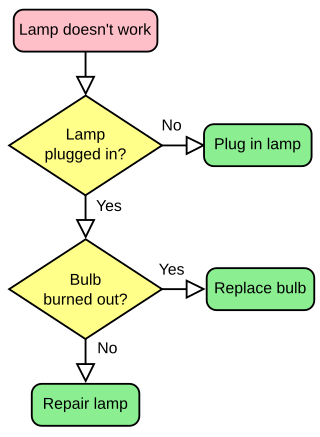Related Research Articles
In philosophy and logic, the classical liar paradox or liar's paradox or antinomy of the liar is the statement of a liar that they are lying: for instance, declaring that "I am lying". If the liar is indeed lying, then the liar is telling the truth, which means the liar just lied. In "this sentence is a lie" the paradox is strengthened in order to make it amenable to more rigorous logical analysis. It is still generally called the "liar paradox" although abstraction is made precisely from the liar making the statement. Trying to assign to this statement, the strengthened liar, a classical binary truth value leads to a contradiction.
Rational choice theory refers to a set of guidelines that help understand economic and social behaviour. The theory originated in the eighteenth century and can be traced back to political economist and philosopher, Adam Smith. The theory postulates that an individual will perform a cost-benefit analysis to determine whether an option is right for them. It also suggests that an individual's self-driven rational actions will help better the overall economy. Rational choice theory looks at three concepts: rational actors, self interest and the invisible hand.
In computer science, referential transparency and referential opacity are properties of parts of computer programs. An expression is called referentially transparent if it can be replaced with its corresponding value without changing the program's behavior. This requires that the expression be pure – its value must be the same for the same inputs and its evaluation must have no side effects. An expression that is not referentially transparent is called referentially opaque.

Self-reference is a concept that involves referring to oneself or one's own attributes, characteristics, or actions. It can occur in language, logic, mathematics, philosophy, and other fields.

The omnipotence paradox is a family of paradoxes that arise with some understandings of the term omnipotent. The paradox arises, for example, if one assumes that an omnipotent being has no limits and is capable of realizing any outcome, even a logically contradictory one such as creating a square circle. Atheological arguments based on the omnipotence paradox are sometimes described as evidence for countering theism. Other possible resolutions to the paradox hinge on the definition of omnipotence applied and the nature of God regarding this application and whether omnipotence is directed toward God Himself or outward toward His external surroundings.

Prudence is the ability to govern and discipline oneself by the use of reason. It is classically considered to be a virtue, and in particular one of the four cardinal virtues. Prudentia is an allegorical female personification of the virtue, whose attributes are a mirror and snake, who is frequently depicted as a pair with Justitia, the Roman goddess of Justice.
Rationality is the quality of being guided by or based on reasons. In this regard, a person acts rationally if they have a good reason for what they do or a belief is rational if it is based on strong evidence. This quality can apply to an ability, as in rational animal, to a psychological process, like reasoning, to mental states, such as beliefs and intentions, or to persons who possess these other forms of rationality. A thing that lacks rationality is either arational, if it is outside the domain of rational evaluation, or irrational, if it belongs to this domain but does not fulfill its standards.
Bounded rationality is the idea that rationality is limited when individuals make decisions, and under these limitations, rational individuals will select a decision that is satisfactory rather than optimal.
Satisficing is a decision-making strategy or cognitive heuristic that entails searching through the available alternatives until an acceptability threshold is met. The term satisficing, a portmanteau of satisfy and suffice, was introduced by Herbert A. Simon in 1956, although the concept was first posited in his 1947 book Administrative Behavior. Simon used satisficing to explain the behavior of decision makers under circumstances in which an optimal solution cannot be determined. He maintained that many natural problems are characterized by computational intractability or a lack of information, both of which preclude the use of mathematical optimization procedures. He observed in his Nobel Prize in Economics speech that "decision makers can satisfice either by finding optimum solutions for a simplified world, or by finding satisfactory solutions for a more realistic world. Neither approach, in general, dominates the other, and both have continued to co-exist in the world of management science".

In psychology, decision-making is regarded as the cognitive process resulting in the selection of a belief or a course of action among several possible alternative options. It could be either rational or irrational. The decision-making process is a reasoning process based on assumptions of values, preferences and beliefs of the decision-maker. Every decision-making process produces a final choice, which may or may not prompt action.
Decision theory is a branch of applied probability theory and analytic philosophy concerned with the theory of making decisions based on assigning probabilities to various factors and assigning numerical consequences to the outcome.
Managerial economics is a branch of economics involving the application of economic methods in the organizational decision-making process. Economics is the study of the production, distribution, and consumption of goods and services. Managerial economics involves the use of economic theories and principles to make decisions regarding the allocation of scarce resources. It guides managers in making decisions relating to the company's customers, competitors, suppliers, and internal operations.

A choice is the range of different things from which a being can choose. The arrival at a choice may incorporate motivators and models. For example, a traveler might choose a route for a journey based on the preference of arriving at a given destination at a specified time. The preferred route can then account for information such as the length of each of the possible routes, the amount of fuel in the vehicle, traffic conditions, etc.

Buridan's ass is an illustration of a paradox in philosophy in the conception of free will. It refers to a hypothetical situation wherein an ass (donkey) that is equally hungry and thirsty is placed precisely midway between a stack of hay and a pail of water. Since the paradox assumes the donkey will always go to whichever is closer, it dies of both hunger and thirst since it cannot make any rational decision between the hay and water. A common variant of the paradox substitutes the hay and water for two identical piles of hay; the ass, unable to choose between the two, dies of hunger.
David Benjamin Kaplan is an American philosopher. He is the Hans Reichenbach Professor of Scientific Philosophy at the UCLA Department of Philosophy. His philosophical work focuses on the philosophy of language, logic, metaphysics, epistemology and the philosophy of Frege and Russell. He is best known for his work on demonstratives, propositions, and reference in intensional contexts. He was elected a Fellow of the American Academy of Arts & Sciences in 1983 and a Corresponding Fellow of the British Academy in 2007.
Backward induction is the process of reasoning backwards in time, from the end of a problem or situation, to determine a sequence of optimal actions. It proceeds by examining the last point at which a decision is to be made and then identifying what action would be most optimal at that moment. Using this information, one can then determine what to do at the second-to-last time of decision. This process continues backwards until one has determined the best action for every possible situation at every point in time. Backward induction was first used in 1875 by Arthur Cayley, who uncovered the method while trying to solve the infamous Secretary problem.
A self-refuting idea or self-defeating idea is an idea or statement whose falsehood is a logical consequence of the act or situation of holding them to be true. Many ideas are called self-refuting by their detractors, and such accusations are therefore almost always controversial, with defenders stating that the idea is being misunderstood or that the argument is invalid. For these reasons, none of the ideas below are unambiguously or incontrovertibly self-refuting. These ideas are often used as axioms, which are definitions taken to be true, and cannot be used to test themselves, for doing so would lead to only two consequences: consistency or exception (self-contradiction).
The philosophy of self examines the idea of the self at a conceptual level. Many different ideas on what constitutes self have been proposed, including the self being an activity, the self being independent of the senses, the bundle theory of the self, the self as a narrative center of gravity, and the self as a syntactic construct rather than an entity. The self is also an important concept in Eastern philosophy, including Buddhist philosophy.
The paradox of tolerance states that if a society is tolerant without limit, its ability to be tolerant is eventually ceased or destroyed by the intolerant. Karl Popper described it as the seemingly self-contradictory idea that in order to maintain a tolerant society, the society must retain the right to be intolerant of intolerance.
References
- ↑ Minsky, Marvin (1986). The Society of Mind . New York: Simon and Schuster. p. 52. ISBN 0-671-60740-5.
- ↑ Klein, Gary (2001). "The Fiction of Optimization". In Gerd Gigerenzer, Reinhard Selten (ed.). Bounded Rationality : The Adaptive Toolbox (1 ed.). London: MIT. pp. 111–112. ISBN 0-262-57164-1.
Thus, if I want to optimize, I must also determine the effort it will take to optimize; however, the subtask of determining this effort will itself take effort and so forth into the tangle that self-referential activities create.